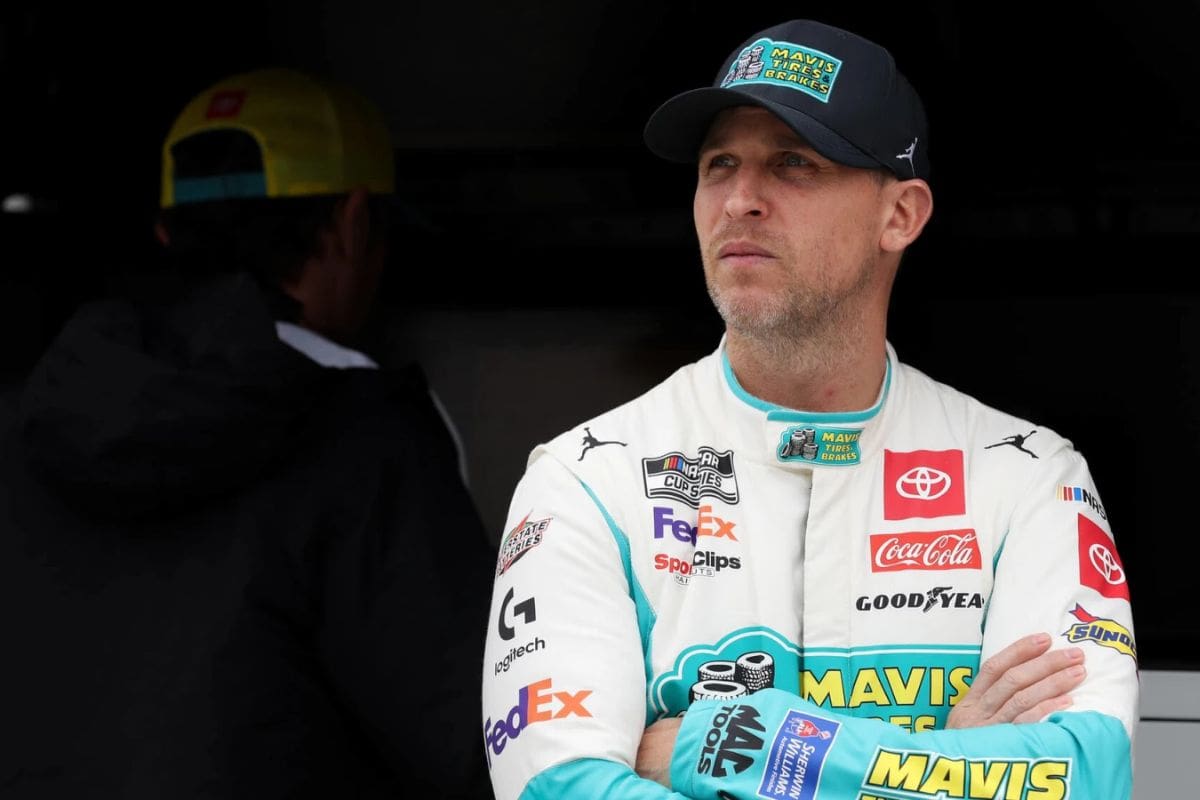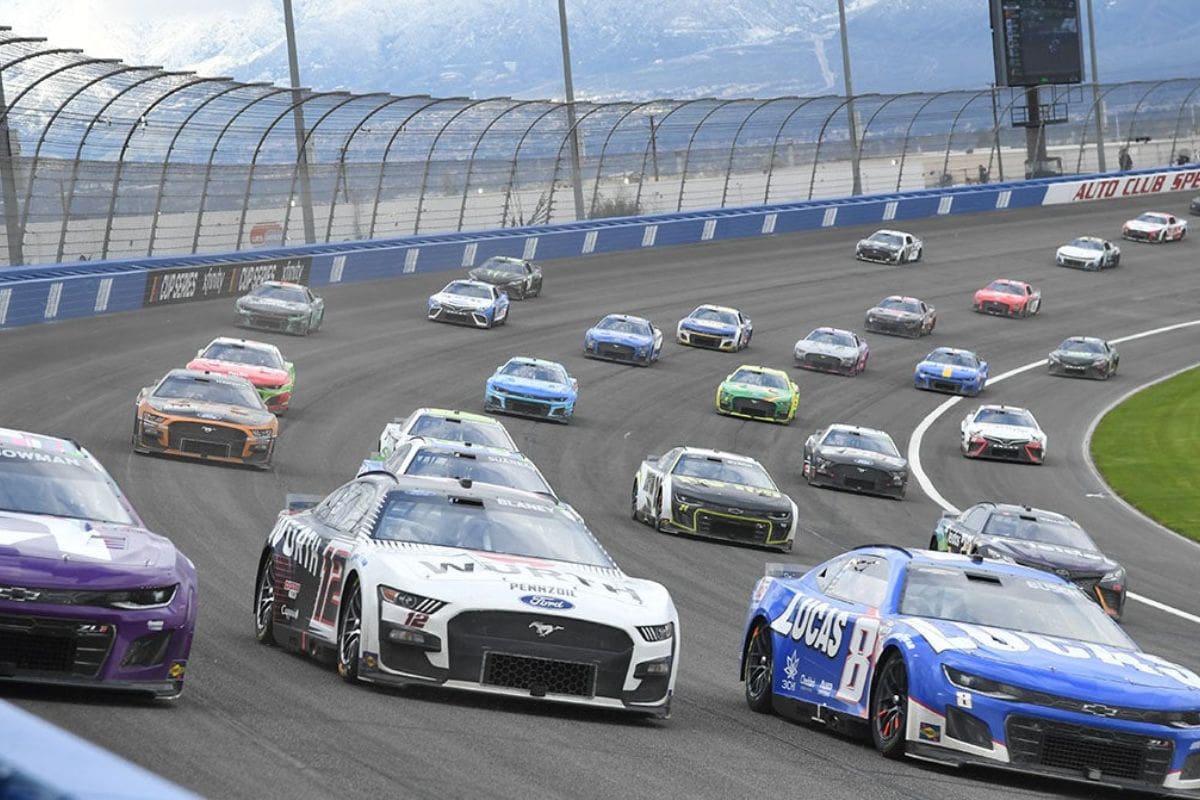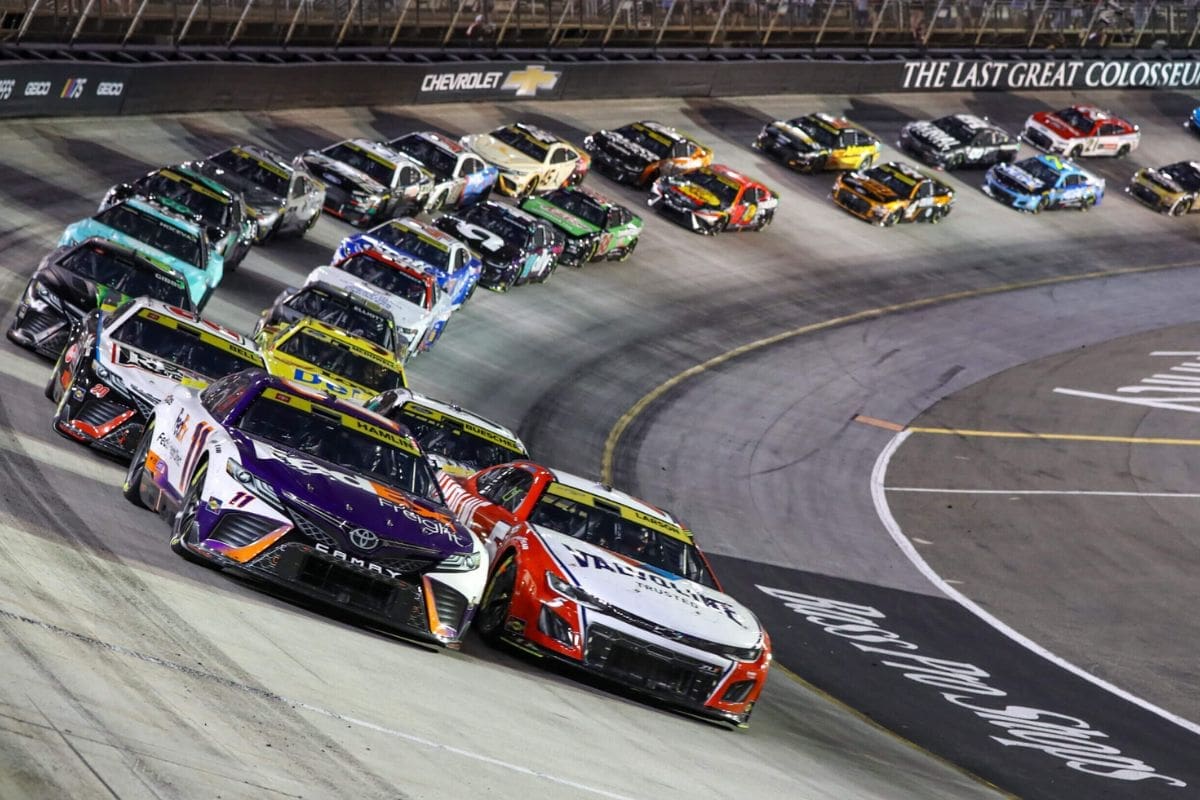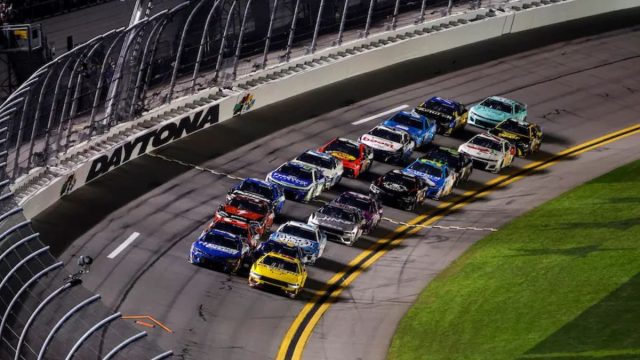NASCAR’s Controversial Money Move: NASCAR’s latest financial maneuver, involving the introduction of a stringent budget cap and potential team ownership by the France family, has sparked a contentious debate within the racing community. Denny Hamlin has voiced significant concerns regarding the stifling of innovation and the potential imbalance it could create among teams. This move, coupled with ongoing charter negotiations and team demands for a more equitable revenue-sharing model, raises critical questions about the sport’s future dynamic landscape and ethical governance. As fans and stakeholders grapple with these groundbreaking proposals, the consequences for NASCAR’s integrity and sustainability remain a pressing topic of discussion.
Key Highlights
- Denny Hamlin criticizes the budget cap and the France family’s potential team ownership for creating conflicts of interest.
- Fans are skeptical that financial caps will ensure competitive balance and equitable resource distribution in NASCAR.
- Teams demand a fair revenue-sharing model, urging NASCAR to reconsider its current financial and operational frameworks.
- Charter negotiations highlight friction between teams and NASCAR, questioning the future stability and fairness of the sport.
- Elimination of the charter system is advocated by fans to restore NASCAR’s integrity and competitive fairness.
Denny Hamlin’s Concerns and NASCAR’s Latest Proposal
Denny Hamlin’s recent remarks have highlighted significant apprehensions surrounding NASCAR’s latest proposals, particularly the suggested budget cap on teams and the potential involvement of the France family as team owners.
Hamlin, a prominent figure in the NASCAR community as both a driver for Joe Gibbs Racing (JGR) and a co-owner of 23XI Racing, has voiced his concerns about the implications of these proposed changes. The budget cap, aimed at curbing escalating costs and promoting a more level playing field, has been met with skepticism by some team owners and stakeholders who fear it could limit competition and innovation within the sport.
“I think there’s still a ton of work to do. Not a little bit of work. Quite a bit. So that’s going to be the priority over the next few months to get this thing a little closer.” – Hamlin

From an analytical perspective, the introduction of a budget cap could indeed have profound implications for the operational dynamics of NASCAR teams. Teams with significant financial resources have traditionally utilized their assets to gain competitive advantages, investing heavily in technology, talent, and infrastructure. By imposing a budget ceiling, NASCAR aims to reduce these discrepancies, ostensibly fostering a more competitive and equitable environment.
However, this approach also risks standardizing team performance and could potentially discourage investment in cutting-edge advancements.
Equally contentious is the suggestion that the France family, which owns NASCAR, might become directly involved as team owners. This raises ethical and competitive integrity questions, as it blurs the line between regulatory oversight and team participation. Such dual roles could lead to perceived or real conflicts of interest, undermining the sport’s credibility.
Current State of Charter Negotiations and Team Demands
The ongoing charter negotiations between NASCAR and its teams, which have yet to yield a definitive agreement, underscore the persistent friction over the demands for permanent charters and improved revenue sharing.
As the charter agreement currently extends until 2024, the urgency to reach a resolution has amplified, particularly from the teams’ perspective. They argue that permanent charters would provide stability and security, enabling long-term investments and planning. The teams are also advocating for a larger share of the sport’s revenue, which they assert is essential for sustainability and growth in a competitive landscape.
From NASCAR’s standpoint, the reluctance to cede control stems from a desire to maintain centralized governance and operational flexibility. The organization’s hesitance is perceived as a safeguard against potential fragmentation that could arise from decentralized authority. This stance, however, has led to significant pushback from team owners who feel that their contributions and risks are not adequately recognized under the current revenue-sharing model.
The deadlock in negotiations has also sown seeds of uncertainty within the broader racing community. Team owners are increasingly vocal about their dissatisfaction, which has brought the issue into the public eye and heightened scrutiny on NASCAR’s financial and operational strategies. The lack of progress raises questions about the sustainability of the current model and whether a more equitable distribution of resources could foster a healthier competitive environment.
.@NASCAR has included plans for a cost cap to limit team spending beyond a certain point in its latest charter offer. https://t.co/VPGLRcr4wk
— Adam Stern (@A_S12) June 8, 2024
As the deadline looms, the negotiation table remains a battleground of competing interests. The outcome of these discussions will likely shape the future dynamics of NASCAR, influencing everything from team viability to fan engagement.

Implications of Proposed Changes: France Family Ownership and Cost Caps
Guaranteeing the France family to own and operate Cup Series charters while introducing cost caps for teams could fundamentally alter the power dynamics and financial landscape within NASCAR. The potential re-entry of the France family into team ownership raises significant concerns about conflicts of interest, given their dual role as both regulators and participants within the sport. This shift could lead to perceived or actual biases in decision-making, with the France family potentially influencing regulations to benefit their own team operations. The historical context of NASCAR’s governance, which has always aimed to maintain a separation between management and team ownership, underscores the magnitude of this proposed change.
The implementation of cost caps introduces another layer of complexity. While the primary intent of cost caps is to alleviate the financial strain on teams, making the sport more sustainable and competitive, the actual execution of these caps could be fraught with challenges. Teams with greater financial resources may find creative ways to circumvent these restrictions, maintaining an edge over less affluent competitors. Additionally, the cost caps could potentially stifle innovation and technological advancements, as teams might be limited in their ability to invest in new technologies.
Moreover, the cost cap proposal draws parallels with Formula 1‘s similar measures, which have seen mixed results. While cost caps in Formula 1 have leveled the playing field to some extent, they have also led to contentious debates about fairness and competitive balance.
In NASCAR, the introduction of cost caps would require rigorous oversight to secure compliance and fairness, thereby demanding a significant investment in regulatory mechanisms. In general, these proposed changes could redefine NASCAR’s operational ethos, necessitating careful consideration and strategic planning.
Fan Reactions to Proposed Changes
Amid the buzz surrounding NASCAR’s controversial changes, numerous fans have taken to social media platforms to voice their apprehensions and critiques, highlighting concerns over the potential persistence of financial disparities and questioning the general effectiveness of cost caps in fostering true competitive parity.
The prevailing sentiment among these fans is that established teams, endowed with substantial financial resources, will continue to wield an inherent advantage, thereby undermining the intended egalitarian spirit of the proposed reforms.
“The ones with the most money Wins. That’s not going to change. Cap or not.”
“Larson’s Indy 500 costs about to suspiciously jump from $3 million to $20 million, as a cover for Hendrick to skirt the budget cap.”
“Saving $$ gave us a Aero= car that has few areas to work on. No testing little Practice gives us reliance on SIMS yielding ho hum races. France now wants to own teams why? They own NASCAR now! $$$$.” – fans reaction
A significant portion of the fanbase remains skeptical about the efficacy of cost caps as a mechanism to level the playing field. These fans argue that merely capping expenditures does not address the longstanding issue of resource disparities that favor wealthier teams. Critics suggest that established teams will likely find loopholes or alternative means to maintain their competitive edge, rendering the cost caps a superficial solution rather than a game-changing one.
Furthermore, there is a vocal contingent advocating for a return to what they perceive as the golden era of NASCAR. These fans propose eliminating the charter system altogether, contending that doing so would simplify the sport and restore its integrity. They argue that the charter system has contributed to the commercialization of NASCAR, diverting focus from the core essence of racing and competition.
“Let’s get rid of the charters and go back to the old days of NASCAR where teams built the cars in shop instead of this bs.”
“At what point do we come to realize that the best teams are the best teams regardless of how much we try to force parity, and stop destroying the sport in the pursuit of the impossible?” – fans reaction
The discourse among NASCAR enthusiasts is deeply analytical, with many fans providing detailed insights and historical comparisons to support their viewpoints. This robust engagement shows the passionate investment of the fanbase in the sport’s future direction, reflecting a collective desire for changes that genuinely improve competitive balance and preserve the integrity of NASCAR racing.
Uncertainty and Future Outlook
In the midst of a landscape marked by uncertainty, NASCAR grapples with pivotal decisions that will shape its competitive framework and financial sustainability in the coming years. Central to the current discourse are the ongoing charter negotiations, which have exposed the intricate challenges of revising ownership structures and financial regulations. The friction between NASCAR and the teams reveals a deeper struggle over the allocation of revenues and resources, a core issue that extends beyond immediate financial disputes.
The persistent disagreements highlights the complexities inherent in balancing the interests of different stakeholders. Teams argue for a more equitable share of revenue, advocating for a system that ensures their long-term viability and competitiveness. Conversely, NASCAR’s management faces the task of maintaining the overall fiscal health while fostering an environment conducive to growth and innovation. This delicate balancing act has left the sport at a crossroads, with the outcome of these negotiations poised to redefine its operational landscape.
Amidst this backdrop, fan sentiment has emerged as a critical factor. The racing community’s vocal concerns and frustrations reflect a broader demand for transparency and inclusivity in decision-making processes. Fans, who are the lifeblood of the sport, seek assurance that the changes will not compromise the essence of NASCAR but rather enrich its appeal and integrity.
As negotiations proceed, the sport confronts a pivotal juncture. The decisions made in this period of uncertainty will not only shape NASCAR’s identity but also determine its capacity to adapt and thrive in a rapidly evolving sports entertainment market. The path forward necessitates a collaborative approach, where the interests of all parties are harmonized to secure a prosperous future for NASCAR.

News in Brief : NASCAR’s Controversial Money Move
The introduction of a budget cap and potential team ownership by the France family has ignited significant debate within the NASCAR community. This highlights concerns about financial restrictions, innovation, and competitive balance.
The ongoing charter negotiations and team demands for revenue sharing further complicate the landscape. The fan reactions and ethical considerations surrounding the France family’s dual roles underscore the complexities NASCAR faces.
These pivotal decisions will shape the sport’s financial sustainability and competitive integrity moving forward.
ALSO READ: Brad Keselowski Casts Doubt on NASCAR Charter Deal
